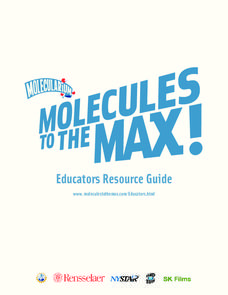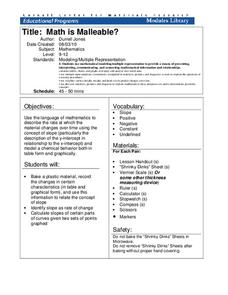Cornell University
Glued into Science—Classifying Polymers
Explore the unique characteristics of polymers. A complete instructional activity begins with a presentation introducing polymers. Following the presentation, young scientists develop a laboratory plan for creating substances using...
Cornell University
Polymers: Making Silly Putty
Putty is proof that learning can be fun! Share the wonderful world of polymers with your class through an experiment. Young scientists create their own silly putty, then examine its properties.
Cornell University
Radical Reactions
The radical reactions of polymers seems abstract to many pupils, but this lesson turns them into a fun building game. Scholars use dice and building pieces to build polymers. Then, they determine the theoretical and experimental weight...
Rensselaer Polytechnic Institute
Molecules to the Max!—Educators Resource Guide
From molecules to nanotubes, an engaging unit explores the world of tiny science. Fifteen hands-on experiments and lessons engage young scientists as they learn chemistry. Discussions, worksheets, and data analysis reinforce the concepts...
Cornell University
Math Is Malleable?
Learn about polymers while playing with shrinky dinks. Young scholars create a shrinky dink design, bake it, and then record the area, volume, and thickness over time. They model the data using a graph and highlight the key features of...
Cornell University
The Making of Macromolecules
Compare and contrast macromolecules made from the same elements. Young scholars learn how the structure of a molecule has as much influence on a compound as the elements in the molecule. They experiment with molecular model kits to...
Cornell University
Polymerization
Explore condensation polymerization and additive polymerization through hands-on activities. Young scholars first model additive polymerization with paperclips. They finish the activity by using condensation polymerization to create a...








